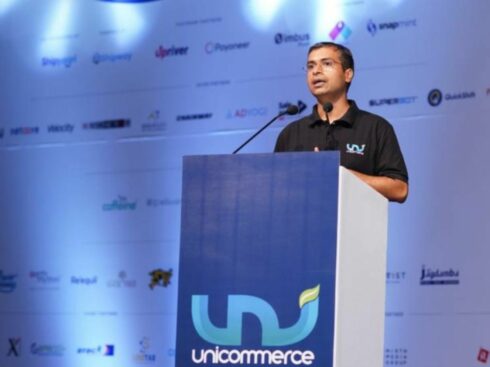
SUMMARY
Today, Technology Is Playing An Instrumental Role In The Growth Of Sectors Like Logistics, Manufacturing, IT, Retail And More
Although technology means different things to different people and business, it would be safe to say that each one of us is heavily dependent on technology in our lives.
Whether it is using IoT enabled consumer durables or AI backed televisions, new age tech has touched every aspect of our lives. It’s no surprise that increasingly businesses in every sector are relying on technology to grow faster, reach more markets and acquire customers at a breakneck speed.
If we look at sectors like logistics, manufacturing which is traditionally not known for using technological innovation, technology laced business platforms has been instrumental in the sector’s rapid growth.
Gone are the days when one would have to call movers separately for a quote. With the advent of new age tech, all one has to do is go on a service provider platform, insert one’s details and let the movers call you.
In sectors like BFSI, IT, retail and pharmaceuticals, the deployment of technology is far deeper and fast evolving. For some businesses, technology may work as an enabler while in many cases technology is the business that drives revenues for companies.
Business models are getting redefined, due to the constant evolution of technology which for many entrepreneurs as well as businesses may be difficult to keep up with.
Moving Beyond Conventional Tactics To Reshape Business Models
From technology as an enabler, we have now moved on to business models that get shaped by it. Case in point – in good old days, one would look at systems such as ERP, SCM, CRM etc. to build better products, improve operations, better customer experience and insights into better decision making.
However today, technological changes and advancements have made some of these business models completely obsolete.
Many business functions are now automated and integrated within the technological ambit of an enterprise which leads to a significant investment cost reduction.
Build Technologically-Driven Organisations
There is a significant ingestion of technology today in every aspect of business and enterprises struggle to appreciate the changes that are happening around them, and we, therefore, see startups, SMEs and MSMEs who end up having a late mover advantage of starting from scratch with a completely new through process using technology as a force multiplier to build new business models, products, and customer experience.
Globally and in India, some businesses have successfully managed to grow and establish their businesses with a healthy dose of technology.
Brands like Air BnB, Byjus, Coursera, Ola, Uber and many more have used technology as the heart of their business and seen success. Their success makes for a strong case to evaluate the use of technology intrinsic to one’s business model to reach important business milestones.
Companies, therefore, have to be ready to completely reinvent themselves before the technology changes end up overwhelming them.
As the creative destruction philosophy that encompasses our philosophy by a triumvirate of Shiva, Brahma, and Vishnu.
Key Technology Focus Areas
It is important to keep moving beyond conventional tactics to reshape, rethink and reimagine business models and use technology as a market disruptive force, if you want to stay ahead of the game or rather stay relevant in the game at all.
Businesses have to move from a traditional thinking of their span of control and therefore the tactics focusing only on – Front-office to back-office and shop floor to Top Floor.
The span of influence today means that your customers could practically be anywhere in the world, therefore, your channels to reach and service them can’t be traditional.
Business models are themselves getting up-ended with concepts such as:
- Heavily personalized customer experience on back of technologies like AI, ML, Analytics
- Asset sharing on back of hugely scalable platforms whether in terms of fixed assets or financial assets
- Granular offerings and therefore pricing models, (e.g. I don’t want to pay for what I don’t use)
- Top floor: Analytics, decision making
- Shopfloor: Sensors, IIOT, smartplants, robotics, machine learning, 3D printing
- Front office: chatbots, AI, ML, Analytics
- Back office: asset sharing platform, 3D printing.
Tips For Entrepreneurs To Leverage New-Age Tech
Startups have an advantage of being agile, ability to change processes and disrupt the industry because they are far more comfortable with letting technology take the lead over established large companies who are still learning the ropes. Thus, it is far easier for startups to build technology run organisations.
In order to do that, keep the following in mind:
- Need to appreciate the latest tech in your business and clients’ sector.
- Recruit and build a team with complementary tech skills
- Need to constant unlearn and learn the latest tech having implications on business model
- Willingness to look at creative destruction of existing structures and technologies.
You can start by creating a small focused cell within your organisations that would be tasked with identifying potential game-changing technology. The head of this cell should think/act like an entrepreneur running his startup within your startup. Allow it branch out on its own instead of looking to bringing it back in.
This can actually emerge as an alternate revenue stream for your business too. You will have your fellow founders queuing to pay for this service which helps them stay updated on new technology and its implementation in their business model.
Role Of A Peer-To-Peer Platform
Peer-to-peer platforms such as ASCENT Foundation serve as a great platform for entrepreneurs to keep in touch with the changes that are embracing not just theirs but a large of part of the business ecosystem.
With the concept of “Trust Groups”, entrepreneurs have the opportunity to think laterally and embrace technology and business models that may have worked in a completely different industry and see if there are components that can be leveraged for themselves.
In our case, ASCENT Foundation has helped us understand the latest security challenges and devise appropriate solutions to help our enterprise clients beat threats in their environment.
Through various conversations around all aspects of businesses, entrepreneurs are able to identify core challenges that might be affecting both their professional as well as personal growth. It is with the support of the members of the “Trust Group” that they are able to not only identify these challenges but also find a suitable solution to address these challenges.
About the author
Pankit Desai is an ASCENT Foundation member, Co-founder and CEO, Sequretek, is passionate about technology. Having worked
in the most developed market – the US – he has relevant exposure and understanding of how technology can shape businesses.
He runs Sequretek, which is a cyber-security start-up and is based out of Mumbai.


























